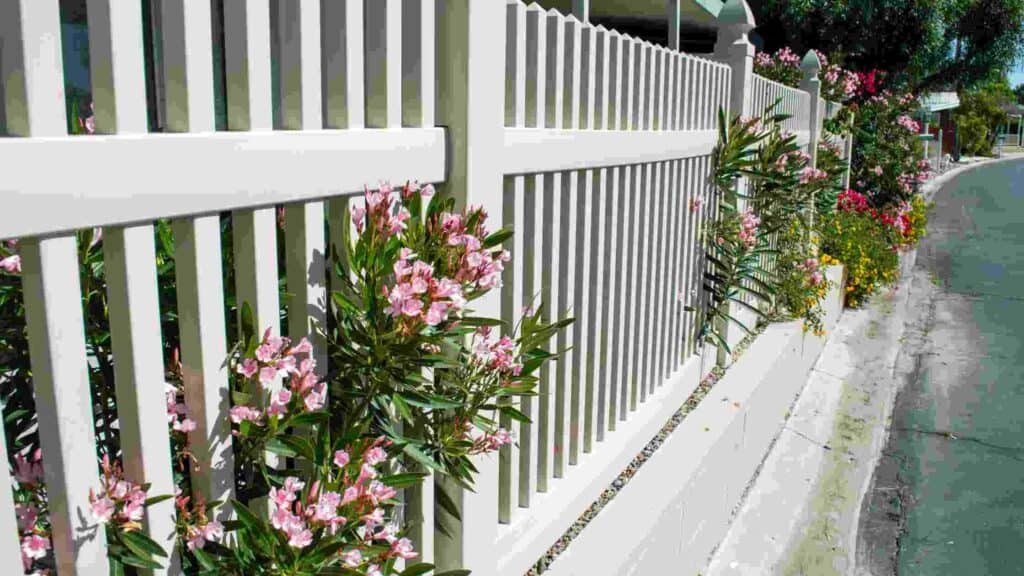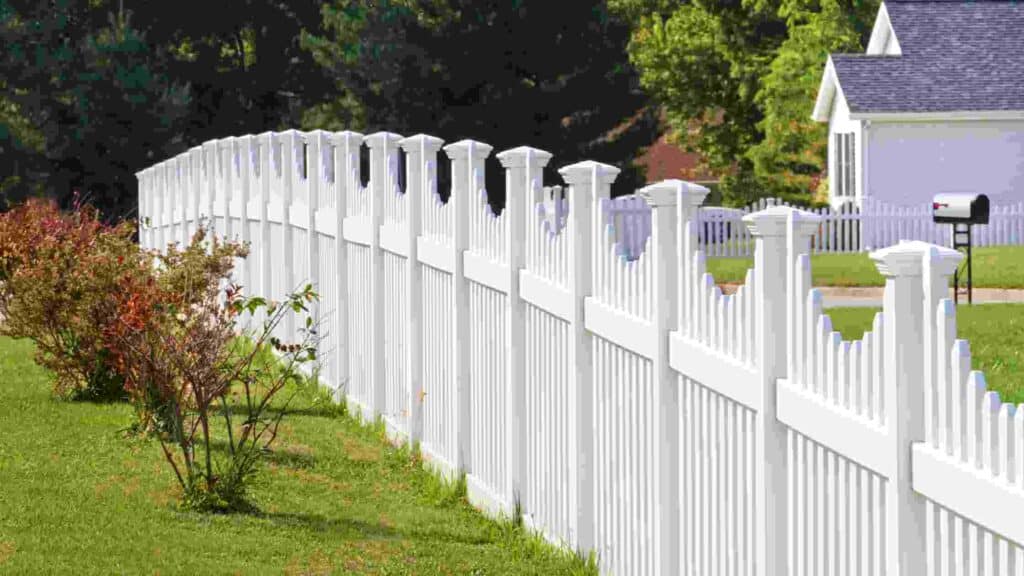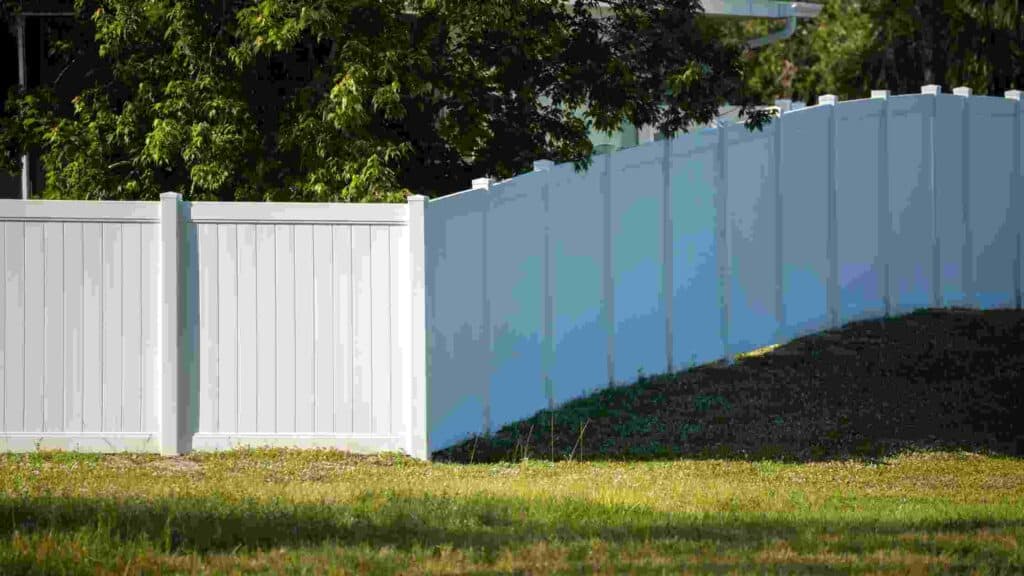When you’re putting up a fence, you want it to last long, right? Obviously, you’re not just building a fence for the sake of it. You want something that can stand the test of time and give you real value for your hard-earned money. So, how long does a vinyl fence last?
Since the 1980s, vinyl has come a long way, and with the introduction of titanium oxide, it has become one of the most durable products out there. In fact, it can outlast a wood fence by a significant margin, no kidding! Vinyl can hold its ground for decades, at least twice as long as wood fencing.
What makes vinyl fencing so great? For starters, it requires virtually no maintenance. You don’t have to worry about dry rot, fungus, termites, or even fire damage. Vinyl can handle it all and still stand tall.
How Long Does A Vinyl Fence Last?
On average, a well-maintained vinyl fence can last for 20 to 30 years, making it a long-term investment for your property.
The key to its extended lifespan lies in its construction using high-quality PVC (polyvinyl chloride) material, which is resistant to moisture, rot, and pests.
Additionally, advancements in technology have improved vinyl fencing over the years, making it even more robust. Titanium dioxide is often added to the PVC mixture to enhance UV resistance, preventing fading and discoloration caused by prolonged sun exposure.
Unlike wood fences which may require regular staining or painting to maintain their appearance, vinyl fences require minimal upkeep.
Vinyl Fence Maintenance: Do Vinyl Fences Need Maintenance?

Vinyl fencing can resist pests, take on harsh weather, and fend off fungus and decay. You won’t have to worry about it decaying, rotting, or breaking down over the years.
Keeping your vinyl fence looking pristine is easy. All it needs is periodic cleaning with a cloth and mild detergent.
And every once in a while, give it a good hose down with a high-speed nozzle to get rid of debris and dirt (find out how to clean a vinyl fence)
Vinyl Fencing Aesthetics
When it comes to keeping your fence looking pristine, there’s one clear winner: vinyl. Vinyl fences now come in a stunning array of styles and colors, some even mimicking the classic charm of real wood.
But guess what? Vinyl doesn’t just stop at looks; it’s got the brawn to match its beauty, making it the preferred choice for fencing.
A World Of Designs
Vinyl fencing systems offer a world of possibilities when it comes to design. Whether you’re all about privacy or fancy a charming picket fence, vinyl has got options. Ornamental, semi-privacy, post and rail – you name it.
And here’s the best part – it looks clean and polished, thanks to hidden picket fasteners and notched rails. Those large, welded posts add extra strength to support gates while keeping that beautiful look intact.
Colors That Endure
Have you ever seen a fence that starts to fade and chalk under the blazing summer sun?
Well, that is not an issue with vinyl! The colors of vinyl fencing are here to stay, standing the test of time – no chalky mess, and no loss of strength.
Vinyl Fence Cost
You might be thinking. “But vinyl is more expensive upfront than wood fencing!” And you’re right, it is.
But here’s the thing: when you consider the upkeep costs and maintenance for wood fences over the years, vinyl actually saves you more money in the long run. It’s a smart investment for your fence.
Think about it this way. After that initial investment, you can sit back and relax. You won’t need to keep shelling out your hard-earned money for repairs and maintenance.
And, if you’re worried about the installation cost, here’s a tip. Mix it up! You can save some bucks by using different materials in combination. Plus, it adds a touch of uniqueness and style to your landscape.
Vinyl Fencing Installation

Putting up your vinyl fence is straightforward. Get those posts set right, and the rest is smooth sailing. It’s just like installing a wood fence, but with some extra perks that make it easy.
Post Perfection
First things first, space those fence posts correctly, and you’re off to a great start. Once you’ve got that done, assembling the fence panels is simple.
Rails just snap right into the post slots and lock in place with locking tabs. The boards interlock with each other, and plastic U channels keep them secure.
Panelized Or Board And Rail
You’ve got two varieties to choose from – panelized and board and rail systems. With the panelized system, you hang those panels between the posts, creating a sleek look that’s hard to beat.
On the other hand, the board and rail system give you individual boards and rails, giving off that classic wood fence vibe but with all the advantages of vinyl.
Safety And Environmentally Friendly
Vinyl fences are super safe because they have no splinters, sharp edges, or nails lurking around.
And here’s another reason to go vinyl even more – it’s environmentally friendly! No toxins to pollute the air or seep into the ground.
DIY Or Pro Help? You Decide!
Installing your vinyl privacy fence can be a do-it-yourself adventure!
Many DIY homeowners can handle it and some vinyl fence kits make it even simpler for you. Just follow the instructions, and you’ve got yourself a brand-new fence.
But, if DIY is not your strength, you can always call in the professionals, and they’ll handle it all for you.
You may also be interested in checking out how to install an aluminum fence.
What Is Vinyl Fencing Made Of?
Now, not all fences are created equal. So, here’s a pro tip – choose a reputable manufacturer.
You don’t want to end up with a fence that looks great at first but turns out to be a flimsy dud in the long run. It’s worth paying attention to where the fencing material is made and what warranty is offered.
Mono Or Co-Extrusion
Vinyl fencing can be made through two primary processes: mono-extrusion and co-extrusion.
Let’s break it down.
The mono-extrusion process involves using 1 vinyl compound or layer of material, and it’s injected with ultraviolet inhibitors. Now, these inhibitors are the pricey aspects that protect the fence from the sun’s harmful rays.
On the other hand, co-extrusion takes things up a notch. It creates a fence with even greater strength and durability. How? By having 2 layers – an outer layer with ultraviolet inhibitors and an inner layer with reduced ultraviolet protection.
Yes, it demands a higher investment in manufacturing, but guess what? It significantly lowers material costs, making it a win-win situation. You get a top-quality, more affordable vinyl fence that doesn’t compromise on excellence.
To make vinyl fencing strong and durable, it needs a combination of special additives and modifiers.
Vinyl come in various thicknesses and sizes, so don’t be shy to ask your dealer for detailed material specifications. Better yet, get some samples and make comparisons. Choose the vinyl that suits your style and needs perfectly.
What Lasts Longer Wood Or Vinyl Fencing?

Now, some might wonder, “Can a vinyl fence really withstand the elements?” You bet it can! Vinyl fences are built to last, and they’re even tougher than wood fences.
Sure, extreme pressure might cause them to come apart a bit, like when a snowplow takes on a load of snow against the fence. But most homeowners can easily repair them within minutes.
FAQs
1. What are the disadvantages of vinyl fencing?
The disadvantages of vinyl fencing include its higher upfront cost, limited color options, potential for fading over time, and difficulty in repairing if damaged.
2. Which fencing lasts the longest?
Among common fencing materials, aluminum fences tend to last the longest due to their excellent resistance to corrosion and weathering.
3. What are the pros and cons of vinyl fencing?
The pros of vinyl fencing include durability, low maintenance, and resistance to rot and pests, while the cons are higher initial cost, limited color options, and potential for fading.
4. How long do aluminum fences last?
Aluminum fences can last for several decades due to their rust-resistant properties and low maintenance requirements.
5. What are some vinyl fence problems?
Some vinyl fence problems include cracking in extreme temperatures, fading from prolonged sun exposure, and potential difficulty in finding matching replacement parts for repairs.
6. How long does wood fence last?
The lifespan of a wood fence can vary depending on the wood type and maintenance, but it typically lasts around 15 to 20 years.
For more details, check out: how long does a wood fence last?
7. How long does composite fence last?
Composite fences can last around 25 to 30 years or more due to their combination of wood and plastic, providing resistance to rot and insects.
Conclusion: How Long Does A Vinyl Fence Last?
You’ve got your vinyl fence installed, and guess what? Your street cred just shot through the roof! Your curb appeal is on fleek, and your property value will increase. Not to mention the added protection, privacy, and security from the elements.
A vinyl fence can last for several decades, at least twice as long as a wood fence (check out: how long does a cedar fence last?)
So, if you want a fence that’s easy to install, safe, eco-friendly, and looks fabulous for years to come, vinyl fencing is the answer to all your dreams!
